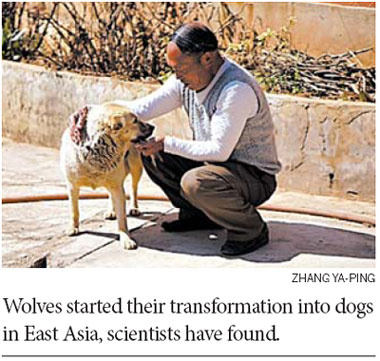From predator to couch partner
Updated: 2013-06-09 05:48
By Carl Zimmer(The New York Times)
|
|||||||

Imagine a wolf catching a Frisbee a dozen times in a row, or leading police officers to a stash of cocaine, or just sleeping next to you on your couch. It's a stretch, to say the least. Dogs may have evolved from wolves, but the minds of the two canines are profoundly different.
Dog brains have become exquisitely attuned to our own. Scientists are zeroing in on some of the genes that were crucial to the rewiring of dog brains. Their results may not only help us understand how dogs turned into man's best friend, but could also teach us something about the evolution of our brains: Some of the genes that evolved in dogs are the same ones that evolved in us.
To trace the change in dog brains, scientists had to work out how dog breeds are related to one another, and how they're all related to wolves.
Zhang Ya-Ping, a geneticist at the Chinese Academy of Sciences, has led an international network of scientists who have compared pieces of DNA from different canines. They've come to the conclusion that wolves started their transformation into dogs in East Asia.
Those early dogs then spread to other parts of the world. Many of the breeds we're most familiar with emerged only in the past few centuries.
Meanwhile, back in China, early dogs lingered on for thousands of years. Today, they're known as Chinese native dogs. "The Chinese native dogs live in rural villages, helping humans to guard homes," Dr. Zhang wrote in an e-mail.
Dr. Zhang and his colleagues see Chinese native dogs as the key to better understanding how dogs evolved. Recently, they sequenced the genome of Chinese native dogs and compared them with the genomes of Asian wolves and modern breeds like German shepherds.
By comparing genomic mutations, they've been able to estimate when wolves and dogs diverged. As they reported on May 14 in the journal Nature Communications, they found that the split started 32,000 years ago.
Those early dogs would have encountered small bands of hunter-gatherers. People didn't settle in villages to farm in East Asia until about 10,000 years ago.
After dogs split from wolves, their genes began to evolve in a new direction. Dr. Zhang and his colleagues were able to identify some of these evolving genes. A number of them, it turned out, are active in dog brains. (Dr. Zhang published some of these results in April in the journal Molecular Biology and Evolution.)

Some of the genes that evolved early in dog evolution involve smelling or hearing. Others are active in a region of the brain called the prefrontal cortex, where mammals make decisions about how to behave. Some genes are involved in growing connections between neurons. One gene, called SLC6A4, transports a neurotransmitter called serotonin into neurons.
The results offer hints about how wolves first turned doglike. "The conventional view is that the hunter-gatherers go out and get a puppy," said Chung-I Wu of the University of Chicago, an author of the Nature Communications study. If humans did breed early dogs this way, then dogs would have descended from a very small population.
That's not what Dr. Wu and his colleagues have found, though. Instead, it appears that a large population of wolves started lingering around humans - perhaps scavenging the carcasses that hunters left behind. In that scenario, aggressive wolves would have fared badly because humans would kill them, while mellower wolves would thrive. This would mean that we didn't domesticate wolves - they domesticated themselves. SLC6A4 may have played a crucial part in this change, because serotonin influences aggression.
Dr. Zhang and his colleagues are gathering DNA from more dogs and wolves, and they also hope to collaborate with cognitive scientists to see find out how variants of genes like SLC6A4 affect the behavior of dogs.
Their results may also help explain human evolution, as Dr. Zhang and his colleagues found that some of the genes that evolved in dog brains, like SLC6A4, also changed in human brains.
"Humans have had to tame themselves," said Adam Boyko of Cornell University in Ithaca, New York, one of Dr. Zhang's collaborators. "The process is probably similar to dogs - you have to tolerate the presence of others."
The New York Times
(China Daily 06/09/2013 page11)